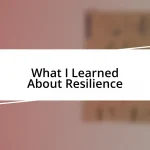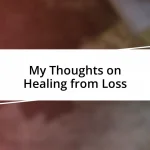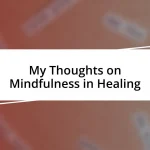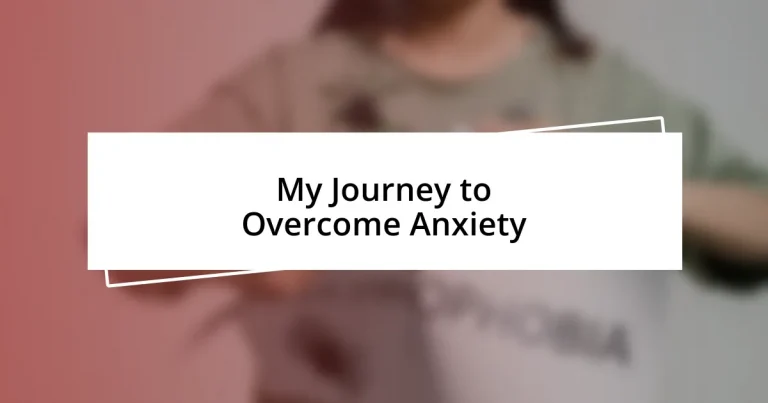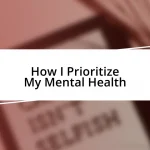Key takeaways:
- Anxiety triggers can evolve over time and vary based on personal experiences; documenting these triggers can provide valuable insights.
- Effective coping strategies include mindfulness practices, physical activity, and building a support network to alleviate anxiety.
- Tracking progress and making adjustments to coping techniques are essential for understanding and managing anxiety effectively.
- Establishing a consistent daily routine with self-care activities can create stability and reduce feelings of overwhelm.
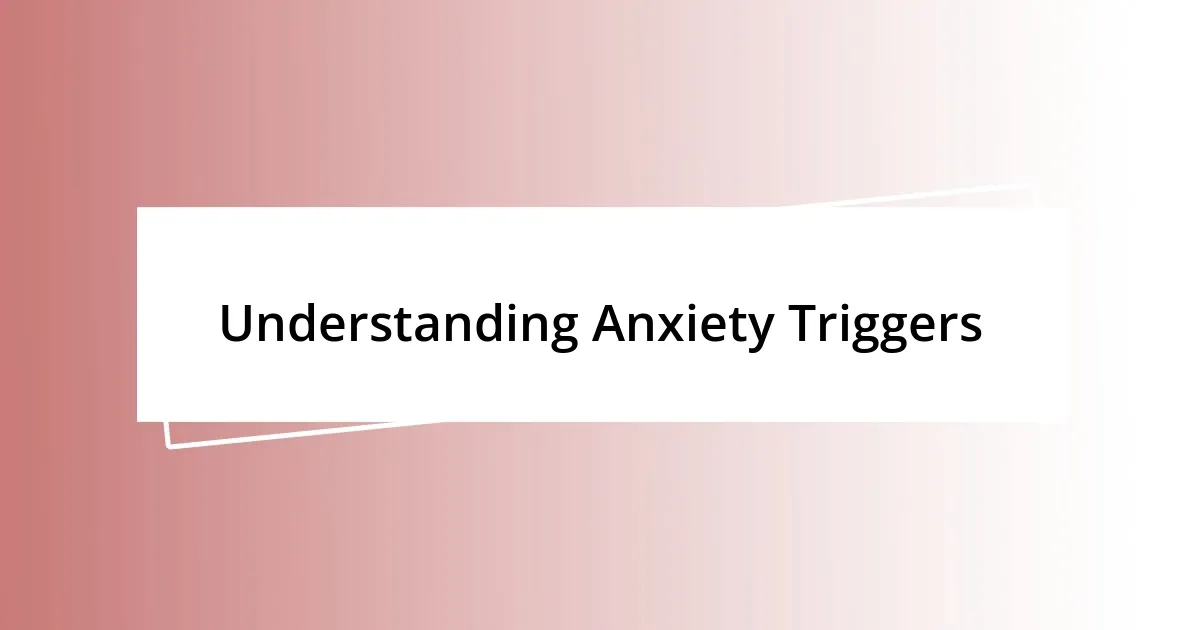
Understanding Anxiety Triggers
Anxiety triggers often manifest in ways that take us by surprise. I remember standing in line at the grocery store, my heart racing for no apparent reason. It struck me then – certain situations, like crowded places or unexpected changes, could flip my calm switch to “on high alert.” Isn’t it fascinating how something as mundane as shopping can trigger such intense feelings?
I’ve noticed that my personal triggers can change over time. For instance, while public speaking used to terrify me, I’ve found that long periods of isolation can now spark anxiety just as easily. This shift really made me realize that triggers aren’t set in stone; they evolve with our experiences and emotional landscapes. Have you ever questioned what triggers your anxiety? Understanding those nuances can be an enlightening part of the journey.
Another insightful realization came when I began documenting my triggers in a journal. I discovered patterns I hadn’t noticed before—like how my anxiety spiked during major life transitions, such as starting a new job or moving to a different city. It was eye-opening to see these connections laid out visually. Have you tried something similar? It’s a great way to illuminate your personal landscape and really dive into the roots of your anxiety.
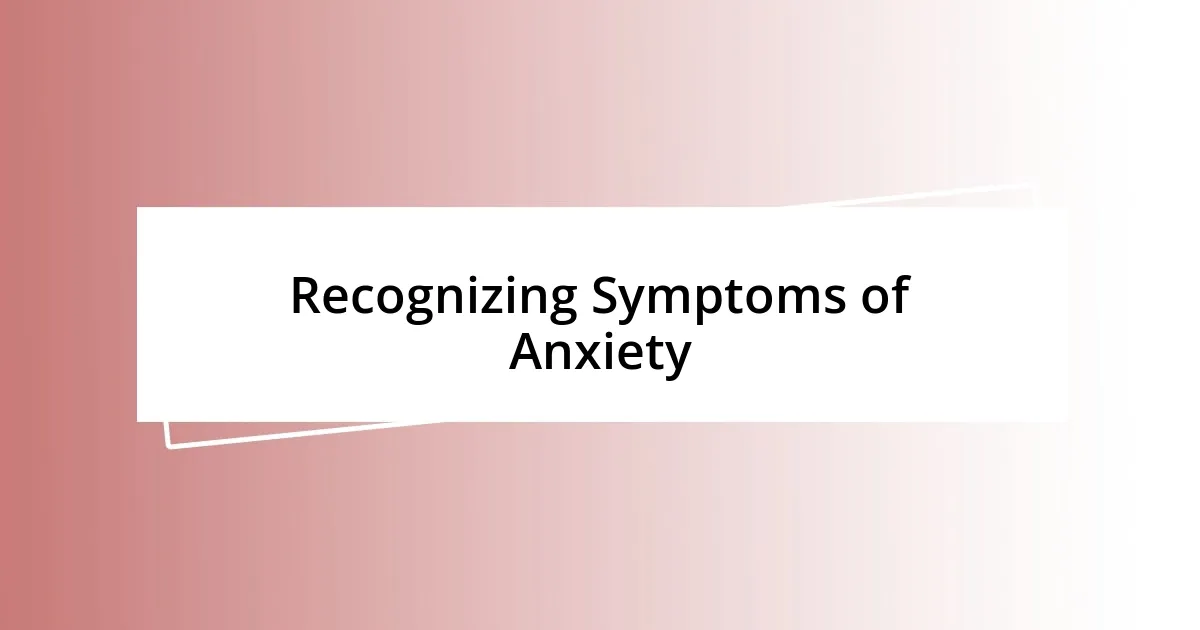
Recognizing Symptoms of Anxiety
Recognizing the symptoms of anxiety can feel like tuning in to a frequency only you can hear. I vividly remember the first time I experienced anxiety: my palms were sweaty, and I couldn’t focus during a conversation with friends. It was as if an internal storm was brewing, disrupting my ability to engage in life fully. This experience opened my eyes to how anxiety can manifest in both physical and emotional symptoms, often leaving us feeling unmoored.
Here are some common symptoms to look out for:
- Increased heart rate or palpitations
- Sweating or trembling
- Feeling restless or on edge
- Difficulty concentrating or mind going blank
- Irritability or mood swings
- Sleep disturbances
- Avoidance of specific situations or places
Realizing that these symptoms weren’t just a temporary phase but rather a pattern was a significant turning point for me. Once I acknowledged my emotional state, I could start addressing it with self-compassion and intention.
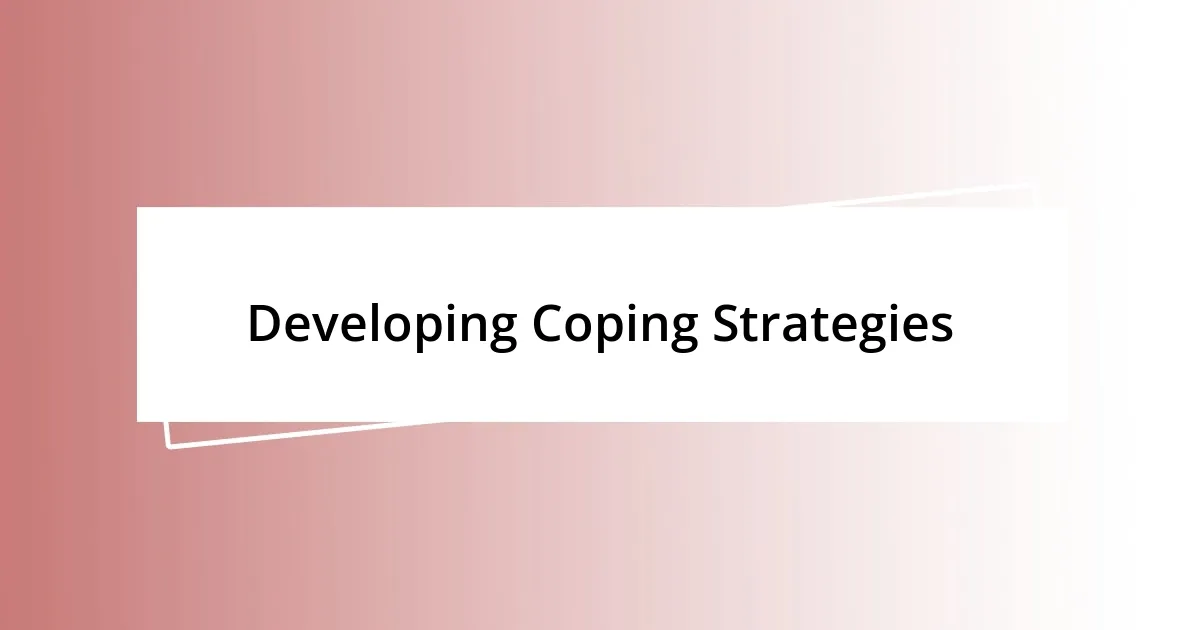
Developing Coping Strategies
Developing effective coping strategies has been integral to my journey with anxiety. One strategy that worked wonders for me was incorporating mindfulness into my daily routine. I remember sitting quietly in my room for just five minutes each morning, focusing on my breath. This simple practice helped ground me; I found that it created a space between my anxious thoughts and my reaction to them. Have you ever tried to just be still and observe your thoughts? It’s transformative, I promise.
Another tactic I discovered is the power of physical activity. Whenever anxiety crept in, a brisk walk turned out to be my best friend. I vividly recall one particularly tough day when I felt overwhelmed by a looming deadline—my legs carried me through the park, and with each step, my worries began to fade away. Movement has an incredible way of recalibrating my mind and body. What about you? Have you ever felt that surge of relief after just a little exercise?
Lastly, building a support network has proven essential. I’ve learned that sharing my experiences with friends who truly understand anxiety can lighten the load. There’s something comforting in knowing I’m not alone, and discussing my feelings offers clarity and perspective. Have you considered reaching out to others? This connection can be a powerful way to diffuse the intensity of anxiety together.
| Coping Strategy | Experience |
|---|---|
| Mindfulness | Creates a space between thoughts and reactions |
| Physical Activity | Recalibrates mind and body, reduces feelings of overwhelm |
| Support Network | Provides comfort and perspective through shared experiences |
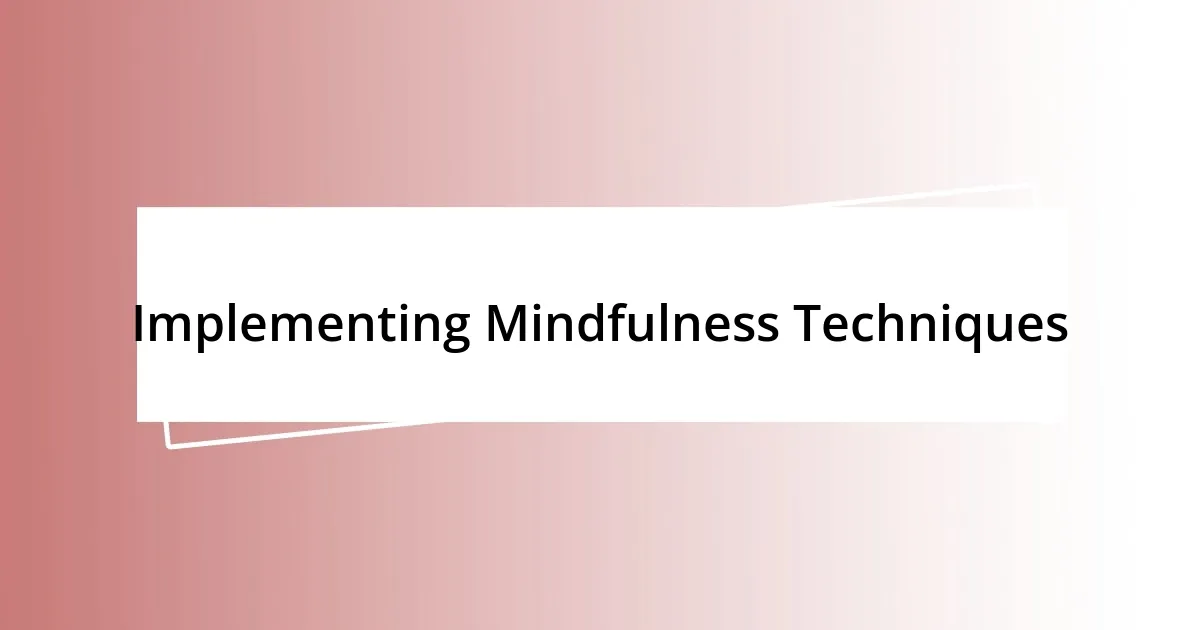
Implementing Mindfulness Techniques
Implementing mindfulness techniques has been a revelation for me in coping with anxiety. I remember sitting on the floor of my living room with my eyes closed, focusing solely on my breath. In those moments of quiet, I could almost feel the chaotic noise in my mind start to settle, like a storm calming down after a heavy rain. Have you ever experienced that moment of stillness? It’s as if time pauses, allowing you to reset.
Not too long ago, I tried a simple yet powerful practice called the “5-4-3-2-1” technique. This involves identifying five things you can see, four you can touch, three you can hear, two you can smell, and one you can taste. The first time I attempted it, I felt a rush of connection to the present moment. I became aware of the texture of my sweater, the faint sound of traffic outside, and the delicious aroma of my morning coffee. It really made a difference. Why does this work so well? Because it anchors you, pulling your mind out of the anxiety-laden future and back into the comforting now.
I’ve found that journaling is another impactful mindfulness technique. At the end of my day, pouring my thoughts onto paper has been cathartic. For instance, I often recount moments where anxiety bubbled up, but by writing about them, I can dissect my feelings without judgment. It’s not just the act of writing that helps; it’s the clarity that follows. Have you tried writing your feelings down? It can be a powerful companion on your journey to understanding and managing anxiety.
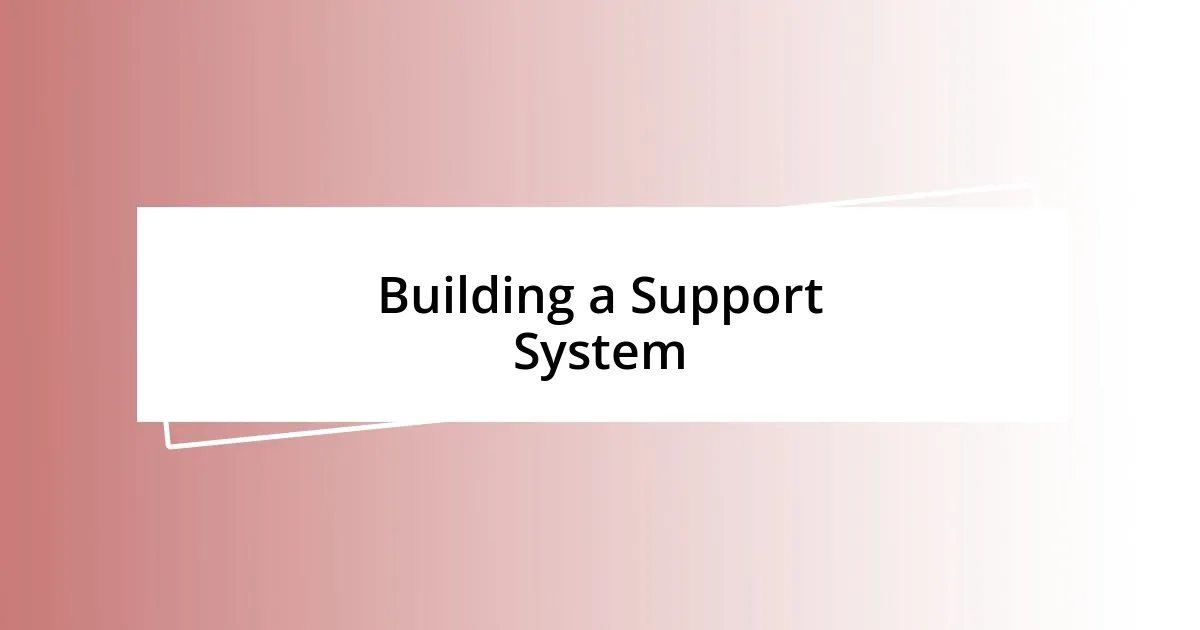
Building a Support System
Building a solid support system has been one of the most significant steps in my journey to overcoming anxiety. I remember the first time I reached out to a friend, feeling unsure but desperate for connection. As I shared my struggles, it felt like a weight lifted off my shoulders. That conversation not only deepened our friendship but also reminded me how vital it is to have someone who genuinely understands what you’re going through. Have you ever found strength in sharing your thoughts with someone close?
Another key aspect of my support network has been joining online communities. These groups have provided a platform where I can express my feelings and hear others’ stories. I recall a night when my anxiety felt particularly overwhelming; reading through posts from people who experienced similar battles gave me an unexpected sense of solidarity. It’s comforting to know that while our journeys are unique, we share common threads in our emotions. Have you ever connected with someone online about your experiences?
Volunteering in my community has also contributed to my support system in ways I never anticipated. By helping others, I’ve not only felt a renewed sense of purpose but also discovered friendships with those who’ve faced their own challenges. One memorable afternoon, I worked alongside individuals who generously shared their experiences of overcoming adversity, and it inspired me deeply. Seeing resilience in others often ignites hope in ourselves. Have you thought about how giving back could enrich your own journey?
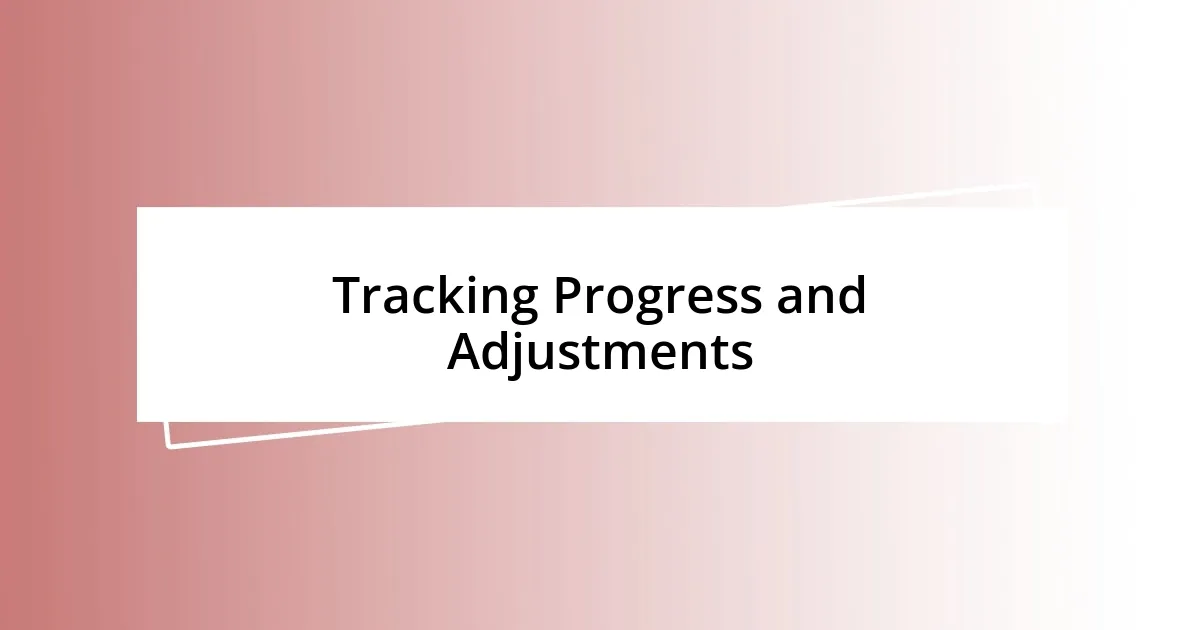
Tracking Progress and Adjustments
Tracking my progress in overcoming anxiety has been both enlightening and daunting. I decided to create a journal dedicated solely to this journey, where each week I reflected on my feelings and any techniques I tried. One particular entry still resonates with me: I noted a significant dip in my anxiety levels after consistently practicing gratitude. How often do we take a moment to acknowledge the good amidst the chaos?
Adjustments have become a key part of my routine. I remember a time when my breathing exercises didn’t seem to alleviate my stress as they once did. So, I explored variations like guided imagery and progressive muscle relaxation instead. The process reminded me that it’s okay to pivot and discover what works best for me. Have you tried switching things up in your approach?
Recently, I’ve started tracking my anxiety triggers more closely through a simple app. It’s amazing how visualizing the patterns can illuminate insights that were previously hidden. For instance, I found that my anxiety spikes during changes in my routine, prompting me to incorporate more flexibility into my days. Have you considered how the structure of your day influences your mental well-being? Understanding this has been a game-changer for my progress.
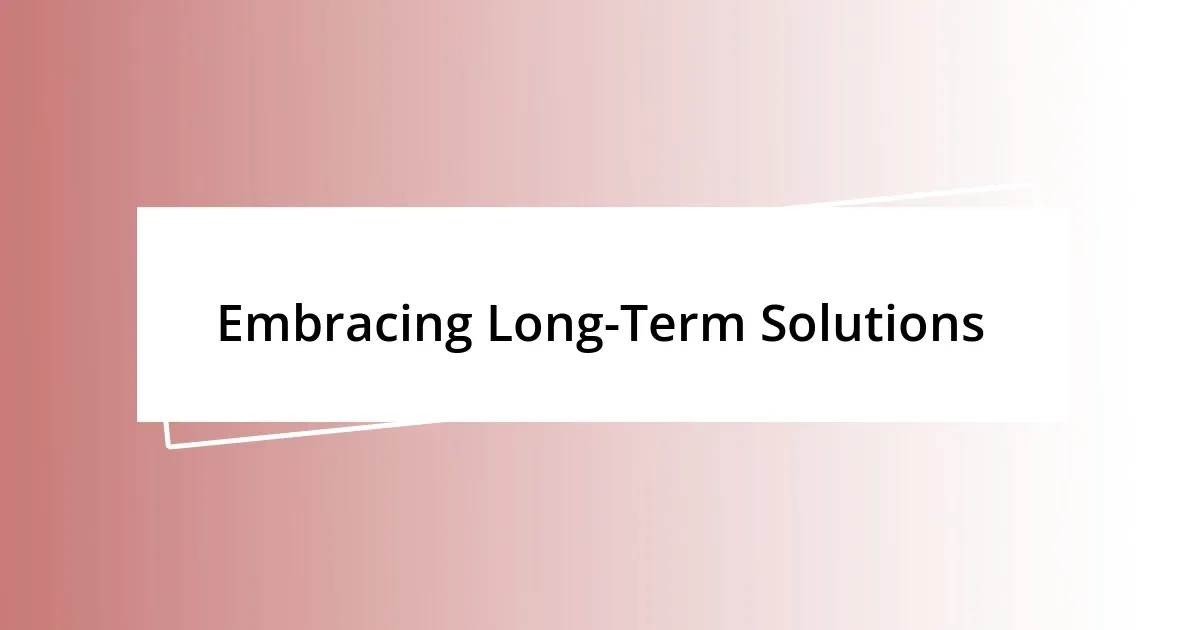
Embracing Long-Term Solutions
Embracing long-term solutions in my anxiety journey has been transformative. I’ve started integrating mindfulness meditation into my daily routine, even if it’s just for ten minutes. I recall one particularly hectic morning when I sat quietly, focusing on my breath. That moment of calm set a positive tone for the rest of my day—making me wonder: have you ever experienced the powerful shift that just a few mindful minutes can bring?
Another long-term approach I’ve adopted is physical activity. Initially, I found it difficult, and the thought of exercising after a long day felt daunting. However, when I pushed past that resistance, I discovered something incredible: moving my body not only distracted me from anxious thoughts but also released endorphins that lifted my mood. Have you considered how much energy you might channel into a physical activity that you enjoy?
Furthermore, I’ve learned the importance of routine in my life. Establishing a daily schedule that includes self-care, like reading or cooking, has provided stability amid the chaos. When I maintain this routine, my anxiety feels less overwhelming and more manageable. It’s fascinating how small, intentional changes in our daily habits can lead to significant shifts in our mental health. What routines have you found comforting in your own life?
